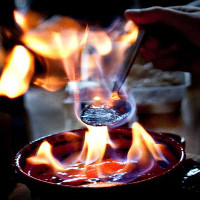When “humidity is 100%” does it mean that the air will become water or not?
A child raised a question regarding the term “air humidity” (or simply humidity ) that he often saw mentioned in weather reports or weather-checking applications. details. Humidity is usually expressed as a percentage (%) as shown below:

Humidity is often seen in weather reports.
For example, today’s weather forecast in Ho Chi Minh City has a humidity of 76%, but what does that mean? If you regularly pay attention to this, you will see that the value of humidity can sometimes reach 100%. Does that mean the air has become water and people are breathing… water into the lungs?
Humidity, in simple terms the amount of water vapor present in the air. Water vapor, as you know, is the gaseous state of water, therefore invisible to the naked eye.

Weather forecasters often use the words “absolute humidity” and “relative humidity” in their reports.
According to How Stuff Works, you may have heard people say “It’s not heat, it’s humidity!” when describing discomfort in the city or environment. This means that there is a large amount of water vapor in the air and causes a more uncomfortable feeling.
It should be noted that the term ” humidity” is often distinguished into: absolute humidity, relative humidity and specific humidity. Weather forecasters often use the words “absolute humidity” and “relative humidity” in their reports.
Absolute humidity is a measure of the total mass of water vapor in a given volume of air. Mathematically, absolute humidity (AH) can be calculated by dividing the volume of air and water vapor mixture as the formula below:
However, the calculation of absolute humidity does not take into account the temperature of the system; This value is affected by changes in air temperature or pressure changes.
On the other hand, specific humidity is the ratio of the mass of water vapor to the total mass of the humid air. Often referred to as “humidity”. So the type of humidity we are discussing here is “relative humidity”.

Specific humidity is the ratio of the mass of water vapor to the total mass of the humid air.
Relative humidity is the ratio of the present vapor pressure of any gaseous mixture to water vapor to the saturated steam pressure in %. Another definition of relative humidity is the ratio of the mass of water per volume present to the mass of water per same volume when steam is saturated.
So if a weather report is to think of it this way: if you have a glass of water half full of water (50%). At this point, you can say the glass of water contains 50% of the volume of water it can fill. The concept of relative humidity is also understood in this way.
Relative humidity is basically the degree of saturation of the air with water (since air can only carry so much water vapor at a given temperature).

A relative humidity value of 100% means that the air cannot add any more moisture.
If the weather statistics show a relative humidity value of 100%, it does not mean that the air has become water. Instead, it means that the air cannot add any more moisture. Fog is a good way to imagine 100% relative humidity.
In other words, 100% relative humidity simply means that the air is currently holding the most amount of water at a certain temperature. Think of it this way: a sponge that is completely (100%) saturated with water does not become water; similarly, 100% relative humidity does not mean the air has turned to water so “leave your diving equipment at home”.

